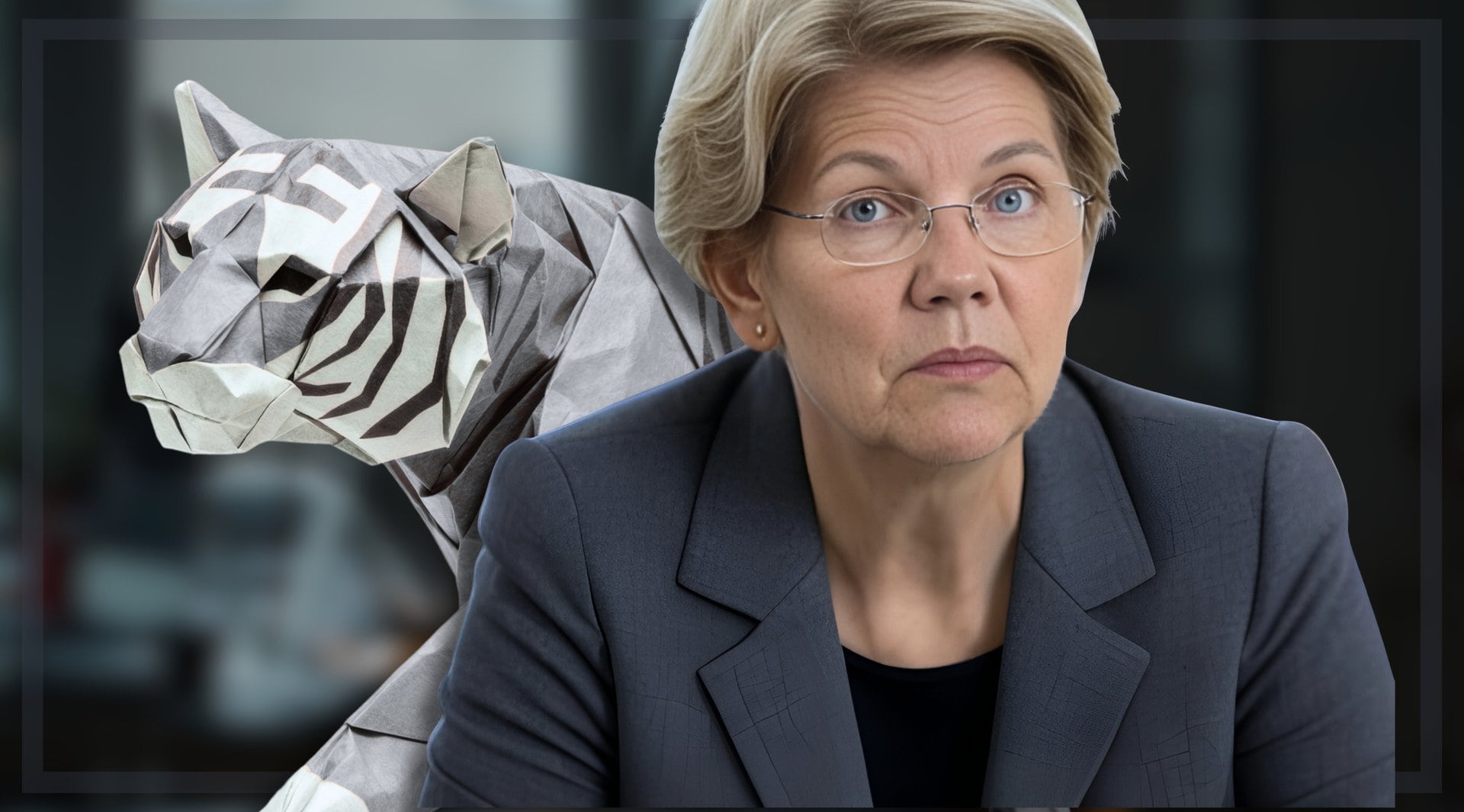Proof of Reserves with The Network Firm
We write a lot about challenges faced by institutional and retail investors alike here at Disruption Banking. In fact, ever since bitcoin appeared on the horizon things have tended to be more rather than less disruptive. With bitcoin came tokenization. Stablecoins backed by US Dollars and Treasuries, together making the sector one of the largest global holders of US treasuries. Add to that bitcoin and other crypto ETFs, many of which are spreading offshore and soon coming to the US. Regulation is struggling to keep up. Meanwhile, transparency gaps for consumers and regulators are growing in all the most important use cases: exchange and custody services, tokenization of real world assets, and the issuance of exchange traded products backed by digital assets.
So, can Proof of Reserves bring more transparency and accountability to digital assets? In today’s story we look at some of the biggest stories and one of the most innovative solution providers on the market.
On October 12 the Commodity Futures Trading Commission announced it filed a complaint with a U.S. District Court against the former CEO, Stephen Ehrlich, of now bankrupt Voyager. The complaint alleges, from at least February 2022 through July 2022, that Ehrlich and Voyager engaged in a scheme to defraud customers by misrepresenting the safety and financial health of the Voyager digital asset platform. Ehrlich and Voyager touted Voyager as a “safe haven” for customers’ digital assets in an otherwise volatile market environment and that Voyager would operate with the “same level of rigor and trust” as a traditional financial institution.
Ultimately this wasn’t the case. So, it’s important to note that earlier this year, the Texas House of Representatives passed a Bill requiring Proof of Reserves for crypto exchanges. Something that directly addresses the types of problems that occurred at Voyager. And last week, US Federal legislation was proposed that would require Proof of Reserves.
The Texas bill mandates that crypto exchange platforms “shall maintain an amount sufficient to fulfil all obligations to digital asset customers” and is overseen by the Texas Department of Banking. The PROOF Act would require such reporting monthly, delivered to the US Treasury.
Texas House of Representatives Passes Bill Mandating Proof of Reserves for Crypto Exchanges https://t.co/i5LITvBZbZ
— The Daily Hodl (@TheDailyHodl) April 22, 2023
Does Proof of Reserves close the glaring gap?
Stories like that of Voyager raised the need for a detailed explanation of customer assets and related customer liabilities from digital assets companies. Both for the benefit of investors as well as regulators. It is also why the likes of BlackRock prefer to partner with Coinbase. Coinbase is a publicly listed company, like Voyager was, which only means that there is more reporting in place. It doesn’t guarantee that customer assets and related customer liabilities are monitored in a consistent and regular manner. There are still many use cases in crypto that create glaring transparency gaps.
Proof of Reserves is an umbrella term that has been used to refer to different use cases: Issuers issuing tokens backed by real world assets, service providers holding customer assets, or exchange traded products backed by, and tracking the price of, specified digital assets.

Texas is unique in how legislators have approached this challenge. The Texas Blockchain Council was key in advocating the legislation specific to service providers holding customer assets, the goal of which is consumer protection. Other countries are following suit, but in Texas the compliance requirement is very specific. Proof of Platform Reserves is an Independent Attest Report from a CPA, under AICPA standards, and includes a customer verification component. Texas Legislators agreed, nearly unanimously, that PoR was a meaningful protection for consumers and the State’s approach provides an excellent template for others to follow.
In the wider world of exchanges, Coinbase allocated $500,000 to support people or teams who are advancing the state of the art in on-chain accounting, privacy preserving techniques related to proof of assets or liabilities. Albeit this isn’t solving anything today, but it can be seen as highlighting how some in the digital assets space are seeking for a solution.
We're excited to see how far we can go as an industry with on-chain accounting and are exploring new ways to prove reserves.
— Coinbase 🛡️📞 (@coinbase) November 25, 2022
We're also announcing a $500k developer grant program to encourage others.https://t.co/ptzMDfwQCX
In the world of tokenization, Tether was one of the pioneers of the stablecoin. Today, Tether dominates the supply of stablecoins. And, while Tether has adopted a form of Proof of Reserves reporting, it is still not at the consistency and regularity level desired by many market participants.
Where Tether is responsible for over half of the entire supply of stablecoins in circulation today. Circle, another leading blockchain company, has more than 15% market share. Interestingly, Circle provides monthly reserve attestation reports. Historically, Circle received attestations from a Top 5 global accounting firm Grant Thornton, with attestations being taken over by Deloitte since January 2023. The blockchain company has been doing this since October 2018. But some have noted the delay in the issuance of these reports (for example at the time of publication, no September-end report had been produced yet) makes them less useful to consumers as they don’t provide timely insight.
Tether itself has been working with global accounting firms BDO, and historically Moore Cayman. But that’s not all. You can see Tether’s entire assets and liabilities from a few days ago on the company’s website.
Other large stablecoin issuers also issue monthly CPA-attested Proof of Collateral Reserves reporting. In fact, this area of Proof of Reserves is the most developed, most standardized, most widely adopted and understood by the market.
Chainlink’s Proof of Reserves product offers to increase the timeliness of transparency to real world assets backing tokens such as stablecoins, commodity tokens, and real estate tokens. By pushing reserves data on-chain at least daily, this is a promising development in consumer transparency. While Chainlink Proof of Reserves data is not CPA-attested, it is aggregated in a transparent manner and could also be described as Proof of Collateral Reserves. This innovation in frequent on-chain reserves reporting is important for all things DeFi. Chainlink is one of the protocols that enhances the stability and transparency of stablecoins. $120 billion stablecoins are in circulation today.
Proof of Reserves and Exchanges
Many of our readers will remember the story about Binance Proof of Reserve Auditor Mazars stopping working with the leading digital assets exchange. In late 2022 and early 2023, Mazars went further and suspended all work with its crypto clients. Kucoin and Crypto.com were also affected. Instead of working to increase transparency for consumers, the priorities for many exchanges seem to be elsewhere.
“Unwilling” is just one of the descriptions of the desire of public accounting firms to validate proof of reserves for digital assets companies today.
However, while some have retreated from the larger digital assets space, The Network Firm is one of the firms providing Auditor-attested Proof of Reserves services as a certified public accounting firm (CPA) today. The Network Firm LLP is a U.S. CPA firm, and its teammembers are recognized as global thought leaders in digital asset assurance solutions. Disruption Banking sat down with Noah Buxton, Co-Founder and CEO of The Network Firm to find out more. Jeremy Nau, Co-Founder and COO, and Nick Ward, Co-Founder and Assurance Director, also joined the meeting.
Even as demand for companies to provide better financial information and reserves transparency to investors has risen, the appetite amongst many of the Big 4 and public accounting firms hasn’t. Noah sees huge opportunity in the space and attributes other firm’s lack of willingness to address the glaring gap to lack of expertise, lack of the necessary technical tools. And the fact that brightline standards for Proof of Reserves reporting are yet to emerge. He and many of the leadership team at The Network Firm (TNF) have previously worked for large public accounting firms. Firms that used to invest in technology and services used to validate proof of reserves specifically for digital assets. An underserved market.

Standardization across the Industry
“We are true believers in trust and transparency being needed for the digital assets market,” explained Noah. “The ‘tokenization of everything’ holds great promise for more transparent and fair private capital markets. However, without robust and consistent tools and reporting for off-chain assets and their value, tokenization will be hindered,” he added.
Whilst the team at The Network Firm are keen on extolling the potential benefits of Proof of Reserves to policymakers, regulators and market participants, Noah highlighted how Proof of Reserves alone is not a panacea, just a positive addition to existing financial statement audit and other third-party assurance reporting.
To give some context, Noah and his team contributed to The Chamber of Digital Commerce Proof of Reserves Initiative. Resulting in the publication of “The Practitioner’s Guide to Proof of Reserves,” which appears to be the most holistic source of information relating to Proof of Reserves available today. The Guide advocated for an industry-wide standardization of Proof of Reserves reporting to increase confidence that exchanges and custodians are managing their assets appropriately. The Guide, now being expanded for a 2023 update, was the first time the industry coalesced on an actionable rubric for adopting such a standard.
#Crypto platforms should implement a “Proof of Reserves” process that will help prevent scenarios like we saw w/ #FTX. @DigitalChamber issued a report in 2021 outlining how custodians and exchanges should have adequate reserves to build trust. https://t.co/BoudC4GHDz pic.twitter.com/ItKkpHOBL0
— Chamber of Digital Commerce (@DigitalChamber) November 16, 2022
The Demand for Proof of Reserves
“We don’t think that Proof of Reserves is a replacement, or a substitute, for a financial statement audit or a regulatory examination,” Noah explained. “We do think that Auditor-attested Proof of Reserves reporting, properly planned and performed, can offer consumers and regulators additional and more frequent insight into the key question. Are the reserves really there? And are they sufficient to meet the corresponding customer liabilities?”
Noah added how “private company audited financial statements aren’t made available to customers of the largest exchanges. So, they are a good compliance tool for licensing, but they don’t offer customers any insight.
“However, frequent Auditor-attested Proof of Reserves reporting requires a commitment to customer transparency that has significant deterrent and detective effects. If customers get to look under the hood quarterly, or even more frequently, the service provider has less opportunity to mis-manage reserves or fail to disclose lost reserves from insider or outsider theft.”
Noah continued by adding that an Auditor-attested Proof of Reserves engagement is similar, but also different to what a CPA Auditor would do when performing a financial statement audit. One of the distinctions being how a financial statement auditor would likely sample some of a company’s assets on the balance sheet, based on whether those balances are ‘material,’ with the goal to determine if a balance is reasonably stated. But it would be infrequent if material balance sheet accounts were tested at 100%.
However, an Auditor-attested Proof of Platform Reserves engagement would include procedures to 100% of assets or accounts within the scope of the engagement. So, in both cases, assets are being tested for their count and/or valuation. But in a Proof of Reserves there is no sampling, and therefore less room for material misstatement in the resulting reporting.
Certain types of asset-backed products like exchange traded products (“ETPs”) provide opportunities for near real time Proof of Reserve engagements to be completed. TNF’s platform can allow for a near-live picture of the ETP and the assets that back them. This information can be used by the market and regulators in several ways and can serve as a compliment to a firm’s annual financial statement audit, regulatory reporting, and other investor reporting.
“We’re not saying that financial statement audit is bad. We are proponents of audit. And we’re not saying that Proof of Reserves testing is a perfect solution,” Noah highlighted. “We’re just saying that there is a clear gap here. There are reasonably good means to close that gap to the benefit of all market participants. So those that have the ability, and the expertise should educate the market and help make Proof of Reserves better and more standardized. Not engage in a circular firing squad.”
As #ProofofReserves continues to gain interest, application, & the mandate of consumers, lawmakers & regulators, understanding Proof of Reserves’ place in a larger picture of capital markets-related, third-party assurance will be important@The_NetworkFirm https://t.co/qrPFyJlNAQ
— Digital Startup (@digitalstartup5) October 10, 2023
Public Accounting Firm or Tech StartUp?
Noah shared how today TNF is a CPA Firm. A few moments later he shared how TNF was leveraging its expertise via Chainlink’s secure and reliable decentralized oracle networks (DONs). Something you’d be more likely to hear from a tech startup founder.
The larger vision is much bigger.
“Oracles have a fundamental problem,” Jeremy explained. “They have to rely on the data being provided to them.” Having a CPA firm as a third-party provider to do the data aggregation for a decentralized network of autonomous oracles, like Chainlink, can provide additional participation and reliability to such an on-chain system. That is how the future of finance, accounting and trust will look, Jeremy believes.
LedgerLens™ – TNF’s suite of transparency products for digital asset use cases, is already available offering solution sets to large, global customers who manage billions of dollars in customer funds. The platform provides digital asset financial statement auditing tools, software to enable CPA firms to perform Proof of Reserves and/or Real Time Reserve attestation engagements. And a data aggregation service for on-chain reserves reporting (called LedgerLens Oracle Services). The first of its kind on the market. The idea: its made for auditors, by auditors. And it can unblock auditors to re-enter a space that truly needs their value.
“The decentralized audit network,” is what they call it at The Network Firm.
“This gap, in the context of Proof of Reserves more generally,” Noah added. “This gap is so big [referring to the ‘tokenization of everything’ and the off-chain asset transparency gaps that are present and growing]. It’s bigger than one firm. This technology can be global, and we can make our tech and our expertise accessible to global CPA firms so that they can serve clients in their market.”
Jeremy added how the Network State, by Balaji Srinivasan, is a good example as to what inspired the name of the company. But it also holds significance in the vision of the founding team at TNF. It is a forecast of what will supersede ‘Nation States’.
“What trust is going to be needed in that forecast of the future?” Jeremy asked. “The old way of doing things is crumbling and the new way is being built. And we have an opportunity to shape that future.”
CPA Firms will all work with Digital Assets in the Future
To emphasize the point Nick went into detail. He explained how most of the founding team at TNF had spent most of their careers at CPA firms. The way that today every accounting firm is agnostic to whether a client is a manufacturing, ecommerce or telco company. Tomorrow, digital assets companies will be just another industry client for accounting firms.
“CPA firms are hesitant with the digital assets space,” Nick explained. “They lack expertise and the tools. And the reputational risks are real. But, in the future, due to the natural progression of this market, they will all service the space in one way or another. But they won’t build the tech to do that. They won’t have someone internally that drives that education. They have to look outside. That’s where we can facilitate their success and allow them to focus on client service.”
One of the drivers that Jeremy is seeing is tokenization. Just consider the growth of the stablecoin market in the last two years. A market that was worth $5 billion in January 2020 and is worth over $120 billion today.
The Real Deal, The Network Firm
Jeremy highlighted how TNF can work with data from any jurisdiction across the globe. In fact, it is essential to offer this level of data aggregation. Most of the largest exchanges and digital assets businesses operate in nearly all countries. It would be useless to focus on only one location. Which doesn’t change the fact that TNF is located in Florida. One of the biggest crypto hubs in the world today. TNF is well placed to work with both capital markets and the wider digital assets markets. The company has offices alongside many household names in capital markets and crypto.
But, like any early-stage startup, TNF’s leadership team have approached the challenge they identified with full speed. Proof of Reserves and the affiliated tokens and exchanges that data comes from shows no sign of becoming an easy ride. Unlike tracking the Japanese Yen for instance. Having started TNF earlier in 2023, working within a startup environment has had an unbridling effect on the team.
“We can really go after the things that we want to do,” Jeremy summarized. “And be able to act on a strategy that is all our own.”
Importantly, one of the places you can meet with representatives of The Network Firm is at the upcoming North American Blockchain Summit. This year Disruption Banking is proud to be the media partner of the event that takes place from the 15th to the 17th of November in Fort Worth, Texas.
Meet TNF, Balaji Srinivasan, author of the Network State, and many other leading figures in global innovation at the most important blockchain summit taking place in the U.S. this year. Book your ticket today.
Author: Andy Samu
See Also:
Making Austin a Crypto Hub with ATX DAO | Disruption Banking
Investing in the Future of DeFi with Kommune DAO | Disruption Banking
DeFi’s Oracle Problem, with ChainLinkGod | Disruption Banking















